Never going to let you down: Preventing predictive shrinkage via the STRONG-R assessment method

Abstract
Risk-needs assessments (RNAs) are an evidence-based practice used by practitioners to assign supervision and programming. While foundational to day-to-day practices, these tools are typically applied ‘off-the shelf,’ and are mistakenly assumed to demonstrate equivalent prediction accuracy regardless of location or population. Although researchers and providers are aware these tools experience performance shrinkage, the issue is commonly ignored. In 2016 the Tennessee Department of Correction (TDOC) collaborated with the developers of the Static Risk Offender Needs Guide – Revised (STRONG-R) to create a staged development of a locallydeveloped risk needs assessment. Using propensity score matching, a proxy sample was used to create an initial version of the STRONG-R, representing a TDOC-like sample. This version was deployed in 2017. Following data collection, developers recrafted the tool with local data to make Version 2.0. Findings demonstrate improved performance using this innovative method, effectively eliminating performance shrinkage for the TDOC STRONG-R.